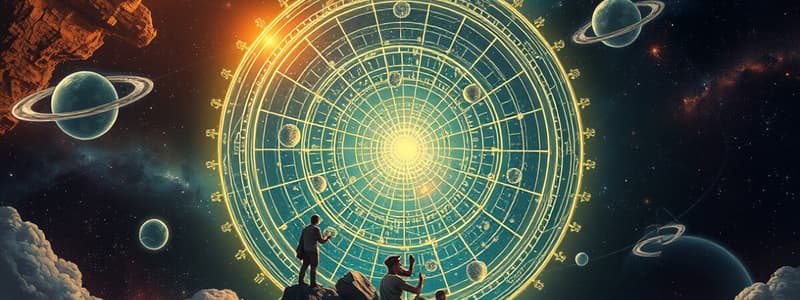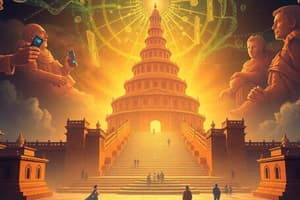Podcast
Questions and Answers
How many people were directly involved in the Scientific Revolution?
How many people were directly involved in the Scientific Revolution?
Only a few hundred
How did the Scientific Revolution handle knowledge - old and new?
How did the Scientific Revolution handle knowledge - old and new?
Researched old knowledge to prove or disprove it. Made institutions.
What was geocentrism?
What was geocentrism?
Idea that the Earth is at the center of the universe
Was the pursuit of natural philosophy formal or informal?
Was the pursuit of natural philosophy formal or informal?
Which of Copernicus' works explained his theory?
Which of Copernicus' works explained his theory?
What did Galileo do with Copernicus' theory?
What did Galileo do with Copernicus' theory?
What is an epicycle?
What is an epicycle?
What was the advantage of Copernicus' system?
What was the advantage of Copernicus' system?
What was the relationship between Copernican and Ptolemaic theory?
What was the relationship between Copernican and Ptolemaic theory?
Who was Brahe, and what did he do?
Who was Brahe, and what did he do?
Who was Kepler, and what was his relationship with Brahe?
Who was Kepler, and what was his relationship with Brahe?
What did Galileo prove?
What did Galileo prove?
Why did the Church condemn Galileo?
Why did the Church condemn Galileo?
What was important about Descartes?
What was important about Descartes?
Why was the existence of God important to Descartes?
Why was the existence of God important to Descartes?
What was Bacon known for?
What was Bacon known for?
What was the goal of science for Bacon?
What was the goal of science for Bacon?
What was the major scientific question that Newton solved?
What was the major scientific question that Newton solved?
What was Principia Mathematica and who wrote it?
What was Principia Mathematica and who wrote it?
What is the theory of universal gravitation?
What is the theory of universal gravitation?
What was Newton's attitude toward religion?
What was Newton's attitude toward religion?
What were Pascal's ideas, which did he support, and what did he not agree with?
What were Pascal's ideas, which did he support, and what did he not agree with?
What idea was a fundamental feature of the expansion of science?
What idea was a fundamental feature of the expansion of science?
Flashcards are hidden until you start studying
Study Notes
Scientific Revolution Overview
- Only a few hundred individuals were directly involved in the Scientific Revolution.
- Knowledge was re-evaluated, leading to new research methodologies and institutions.
Geocentrism vs. Heliocentrism
- Geocentrism posited the Earth as the center of the universe.
- Copernicus challenged this with his heliocentric model explained in "On the Revolutions of Heavenly Spheres."
Key Figures
- Galileo supported Copernicus and used new observational evidence to promote heliocentrism, popularizing the concept.
- Tycho Brahe, a Dutch astronomer, favored an Earth-centered system and produced extensive astronomical data.
- Johannes Kepler, Brahe's assistant, advanced the heliocentric theory with elliptical orbits.
Copernican System Features
- Introduced epicycles—smaller circles for planets moving around a larger circle called a deferent.
- Explained retrograde motion as an optical illusion due to Earth's movement.
- The system maintained some Ptolemaic elements without new evidence.
Galileo's Contributions and Challenges
- Proved the heliocentric theory but faced condemnation from the Church, which struggled with biblical interpretations.
- The Church resisted surrendering the interpretation of the Bible to a layman like Galileo.
Philosophical Contributions
- René Descartes created analytic geometry and emphasized the separation of mind and body.
- Famous for "I Think Therefore I Am," Descartes believed in a non-deceptive God, reinforcing rational thought.
Francis Bacon's Empiricism
- Known as the father of empiricism, Bacon championed experimentation in science.
- He argued that science should yield practical results to improve human life, departing from traditional scholastic methods.
Isaac Newton's Legacy
- Addressed planetary motion in "Principia Mathematica," establishing foundational physics principles, including inertia and gravity.
- Introduced the theory of Universal Gravitation, asserting that all objects experience mutual attraction.
Religion and Science
- Newton viewed nature created by a rational God, suggesting that studying nature equates to studying God.
- Blaise Pascal, allied with Jansenists, believed in the necessity of faith in religious matters, emphasizing human corruption.
The Expansion of Knowledge
- A fundamental feature of this period was the belief in the potential for discovering genuinely new knowledge about nature and humanity.
- Scientific societies emerged, emphasizing collaborative pursuits in scientific inquiry during the 17th century.
Studying That Suits You
Use AI to generate personalized quizzes and flashcards to suit your learning preferences.




